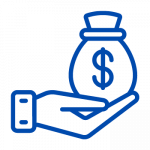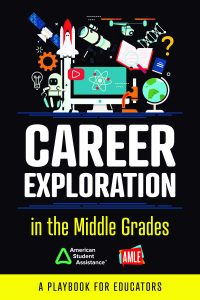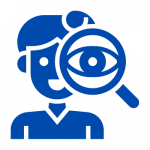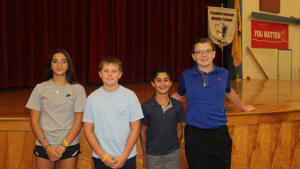Career Exploration in the Middle Grades: Playbooks for Educators and Students
Middle grades educators have the exciting opportunity to interact with students at a pivotal time in their development. The middle grades are “the finding place” that invites young adolescents to be adventurous explorers. Career exploration is a cornerstone of this process and is associated with both positive educational and employment outcomes, keeps students engaged in school, and helps them develop a better sense of self.
That’s why ASA and AMLE have teamed up to create two playbooks that equip educators and young adolescents with roadmaps for effective career exploration. In the educator guide, you will find helpful resources like implementation guides, case studies, and program sustainability resource to help you map your journey from beginning initiatives to school-wide practice. In the student playbook, you’ll find a variety of activities and materials for use directly with kids to help them learn about themselves and think about their futures.
Templates and Resources

Teacher Action Guide
Are you a teacher ready to kickstart career exploration at your school? This guide provides a helpful checklist and guiding questions/tips to aid in your planning process.

Counselor Action Guide
Are you a counselor ready to kickstart career exploration at your school? This guide provides a helpful checklist and guiding questions/tips to aid in your planning process.

School and District Leader Action Guide
Are you a school or district leader ready to kickstart career exploration at your school? This guide provides a helpful checklist and guiding questions/tips to aid in your planning process.

Sustainability Action Guide
All members of the team should plan with an eye toward sustainability. This guide provides a helpful checklist and guiding questions/tips to keep you on the right track.
Programming Year at a Glance
Mapping programming across the school year can help you visualize your program and support accountability. Completing this calendar template will help you keep tabs on your program goals and keep program objectives top of mind.

3 Year Program Goals
Programs are only as effective as they are sustainable. Using this worksheet to create three-year goals will help you prioritize outcomes and determine appropriate strategies and activities for programming.

Programming Outcomes Worksheet
Measuring and evaluating your program is key to sustained success. This worksheet offers a helpful step-by-step guide to establishing an actionable measurement approach.
Observations Form
You will want to draw from a variety of data sources to measure what is working well and what might need more attention. This observation form can help you collect data from a variety of perspectives to help inform program effectiveness.
Budget Expenses Form
Depending on the type of program you create, funding needs can vary significantly. This helpful budgeting form will help you visualize the total funds you will need to successfully execute your program.
Funding for Programs
Funding can be an important factor in helping to sustain or expand current programming to create new ones. This guide provides tips for standing out in a grant application and a list of possible sources of funding.

Components of a Grant Proposal
Many schools combine public funding with additional grant funds to support programming. This document was created to aid educators across roles in writing successful proposals.

Professional Development Planning
Professional development is crucial to program sustainability. This template will help you design professional development activities to support program implementation.
Case Studies
ASA’s Middle School Exploration Program
Free digital ten-lesson curriculum in which students can discover their skills and interests, learn about career clusters, and explore different educational options. Students will leave this program with a better understanding of how to approach decisions regarding their future plans, their skill development, and their career preferences.
Exploring Self
Unit 1 (Lessons 1-4): Through a range of individual and group-based activities, students will explore their own skills, interests, values, and learning styles in relation to others’. By the end of the unit, each student will be able to confidently summarize their own strengths, passions, and attributes.
Understanding Options: Career Exploration
Unit 2 (Lessons 5-7): Now that students understand themselves, they will begin to envision their futures and learn about careers that align with their goals. Games, sorting activities, and presentations fuel the exploration process, helping students gain a clearer picture of the man professional possibilities available to them.
Informing Future Decisions: Education Pathways
Unit 3 (Lessons 8-10): Does every career require a college degree? Students will look at all the post-secondary options available –including college—and discover how to prepare for next steps after high school. Every student will leave understanding their strengths, programs that fit their goals, and growth areas to pursue.
Research in Support of Career Exploration in the Middle Grades
An evidence-based overview of why career exploration is important in the middle grades as well as some of the strategies that can be used with this age group. Includes enumerated recommendations for practitioners.
ACTE & Xello, 2020. Starting Early: Career Development in the Early Grades.
A brief report outlining the value and benefits associated with career exploration & career development in the elementary and middle grades. Includes case studies and recommendations for getting started.
A paper proposing a small-group counseling-based intervention to assist students from rural areas in their career exploration and identity development.
An article describing a 10-unit course intended to boost students’ career adaptability. Compared to non-participants, participating students (10-11 years old) demonstrated significantly more hope, optimism, curiosity, exploration, occupational knowledge, information, planning, and time perspective.
Godbey & Gordon, 2019. Career Exploration at the Middle School Level: Barriers and Opportunities.
An essay describing the importance of career exploration at the middle level, the opportunities for policy and practice, and the barriers to advisement and engagement. Includes recommendations for school leaders and practitioners.
An article outlining ways to support middle school students’ career knowledge and their ability to make informed decisions about their future. Includes resources for teachers in the middle grades.
An article examining the impact of a hybrid (virtual & in-person) intervention in Florida on students’ career and college self-efficacy. Results suggest that participating students exhibited higher self-efficacy beliefs.
A study of a College & Career Readiness [CCR] program for middle schoolers, with and without disabilities. Includes online resources arranged by topic as well as considerations for universal design, technology access, and the need for developmentally appropriate content.
Perna, 2019. Why Career Exploration Must Be a K-12 Priority and One Way to Make It Happen.
An opinion piece suggesting that career exploration must be holistically integrated into schooling throughout the curriculum and throughout the K-12 spectrum. Includes a link to the author’s Career Tree framework.
A long-form article outlining the challenges and inequities associated with access to CTE and high school pathways. The authors discuss the added barriers introduced by COVID-19, the promise of Perkins V, and the opportunities for middle school programming. Includes a nationwide policy landscape analysis and “5 Key Components” of successful middle school pathways.
Hanover Research, 2020. Best Practices in Middle School Career and Technical Education Expansion.
A report outlining best practices in implementing CTE in middle school. Includes 3 case studies, a framework with target outcomes, equity considerations, and major challenges & barriers (esp. related to rural settings and technology access).
Advance CTE, 2019. Putting Afterschool to Work: Career Exploration in Out-of-School Settings.
An article outlining the promises of after-school career exploration programming. Includes a case study and policy considerations.
A webpage from the Bureau of Labor Statistics with resources for career exploration, games, Q&A, and resources for students and teachers in the K-12 arena.









1